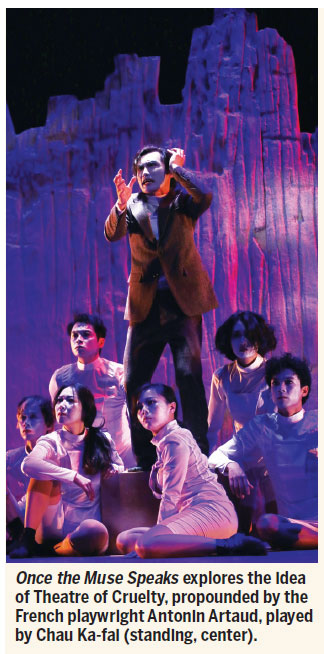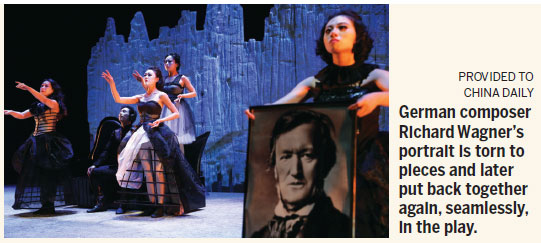Shock and awe
Updated: 2014-09-05 05:27
By Chitralekha Basu in Hong Kong(HK Edition)
|
|||||||||

Alice Theatre Laboratory's newest play, Once the Muse Speaks, begins with a gut-wrenching scream. The howl is a defining element, appearing like a leitmotif throughout the show which debuted at Hong Kong Cultural Centre last weekend. Evidently, the play is not meant for the faint-hearted. Rather, the idea is to expose the audience to blinding lights, eardrum-shattering squeals, gun shots and actors wearing zombie make-up, to make spectators feel completely vulnerable.
Funded by a Hong Kong government arts development initiative and based on a largely-improvised and still-evolving script, the play is an attempt to plumb the depths of the idea of Theatre of Cruelty, propounded by the French playwright Antonin Artaud (1896-1948). Up for close examination are the lives of four artistic legends - Chinese writer Eileen Chang (1920-1995), Spanish artist Salvador Dali (1904-1989), German music composer Richard Wagner (1813-1883) and Artaud himself. Apart from being exponents of modernism in their respective fields, what binds these stalwarts together is that they were troubled geniuses. Apparently deeply-flawed human beings themselves, they did not, however, hesitate to make their own tormented lives the subject of what they would create.
The play, which takes its cues from the lives and works produced by the quartet, could have easily been turned into an erotic fantasy, given that all four have had tumultuous love lives. Also, it's a hugely action-oriented show. Dialogues are indeed spare. Sometimes, it's just gibberish.
But the thrust, clearly, is on the philosophical-intellectual aspect of Artaud's theory. And the action -performed by the cast with amazing synchronicity - is used only as a vehicle by the director Andrew Chan to extrapolate the nuances of four tortured lives - try to make sense of them through the mediation of Artaud's theory.
It's a very stylized representation of raw human emotions. The depiction of violence - verbal, political, sexual - is shocking without being gory or titillating. For example, the Dali episode is as ruthless as it is comic. Known for his obsession with male genitalia, the painter is shown to be staggering under the weight of his own sexuality. Dali being played by a woman - a rather diminutive Grace Yuen, overwhelmed by a giant male organ - enhances the comic quotient.
Although the primary motive is to shock and awe, the play is not without its rare lyrical moments. Like the one in which the novelist Eileen Chang plays with a spot of light - a bubble of happiness projected by her husband Hu Lancheng who will soon betray her. Also the scene where a disgraced Richard Wagner's portrait is torn to pieces to indicate public rage over his alleged affair with Ludwig II of Bavaria and later put back together again, seamlessly, to show he had been re-instated in a position of influence, is almost magical.
basu@chinadailyhk.com

(HK Edition 09/05/2014 page7)